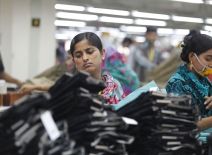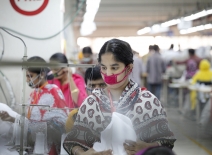
On UK Anti Slavery Day, Cindy Berman, Head of Modern Slavery at ETI, flags up insights on government actions and 5 steps they can take today
- Take a stand – sanctions can be effective
The US Customs and Border Protection Department recently took action against a manufacturer of rubber gloves in Malaysia, a company making garments in China, companies mining gold and diamonds in the Democratic Republic of Congo and Zimbabwe and a manufacturer of bone black in Brazil. Its investigations found evidence of forced labour (and, in the case of the Chinese company, State-sponsored forced labour) and products produced by these companies are now prohibited from entering into the USA.
These actions mark an important shift from the words and agreements signed in law and policy to real action with tangible consequences for companies and governments that exploit and abuse workers. And they go much further than the transparency and reporting requirements in the UK and Australian Modern Slavery Acts, the EU non-financial reporting requirements, and some of the other international measures and commitments that still exist in policy rather than practice. But this kind of assertiveness and leadership by international governments is rare. If we really want to tackle the evil of modern slavery, it shouldn’t be.
- Put workers first …
A word of caution though. Using legislation and sanctions as blunt instruments can harm workers if unintended consequences are not carefully considered. Workers lose jobs when companies withdraw orders and cut off their suppliers. Vulnerable workers, who are often low skilled, of uncertain immigration status and working on precarious contracts have very few employment options and may end up being even more abused and exploited in their next job. Workers rights should always come first.
- Put your own house in order and enforce your own laws
Company reputations take a big hit from media stories about modern slavery. But the truth is that any company found to be using slave labour is unlikely to be the only one in a country where the government fails to apply, enforce and monitor labour laws and regulations. It would a mistake to single out these companies as the “bad guys” without recognising that the entire country, sector or industry needs to be cleaned up.
Modern slavery flourishes when governments turn a blind eye, and fail to enforce their own labour laws, monitor the employment practices of companies, and rely on exporting cheap, exploitable labour to generate economic growth and attract investment.
- Clean up your own supply chain
Government procurement accounts for an average of 15% or more of a country’s GDP. Because of the scale and scope of public procurement, governments and public bodies have huge leverage to mitigate the risk of modern slavery.
Governments often procure goods and services from large, medium and small-sized companies that do not have public reputations to protect, and as such are not subject to the scrutiny of well-known brands and retailers. By changing their tendering and procurement practices, they can reward better practices among their suppliers. That would significantly help to level the playing field for responsible businesses and root out unscrupulous ones.
Procurement practices such as “reverse auctions” (the bidding down of price on government contracts in the name of value for money for the taxpayer) are known to contribute to modern slavery. They have to stop now. Taxpayers deserve value for money, but not at the expense of workers’ rights.
ETI ran a major conference earlier this year on public sector supply chains, in partnership with five governments and multilateral bodies. Read the full report.
- Join the Call to Action on Modern Slavery
The UK government spearheaded a Call to Action on Modern Slavery at the UN General Assembly in 2017, urging governments around the world to sign up to eradicating modern slavery from their supply chains. Has your government joined yet?
ETI runs bespoke training courses for public sector organisations on how to integrate an ethical approach to procurement policies and processes throughout your supply chain. Find out more
Modern slavery – what helps?

Thoughtful partnering and the need to add value

Workers as agents of change

Transparency drives better information and corporate accountability

